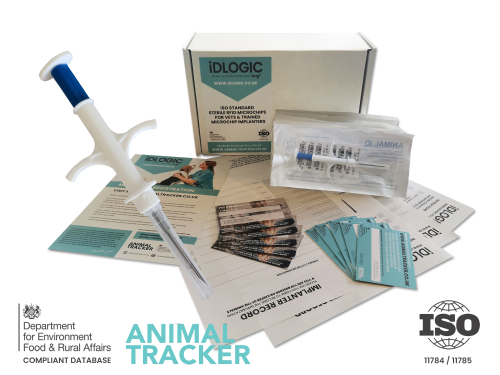What are pet microchips?
A pet microchip is a permanent method of identification. iDLOGIC pet microchips cost just £1.95 and come pre-loaded in a syringe that's designed specifically for pet microchip implantation. The microchip within the syringe is very small – about the size of a grain of rice – and is implanted subcutaneously (just under the skin) between the shoulder blades of the pet. Each chip has a unique 15 digit number that is detected using a microchip scanner. The pet microchip itself has no moving parts, no battery, and doesn't emit any kind of radio wave and is passive until scanned.
Once implanted, the microchip number is recorded on an DEFRA approved pet microchip database along with details about the animal, the microchip implanter, the breeder and the owner (or keeper). Pet owners need to ensure their current contact details are always on the database against the pet microchip number.
Should your pet become lost, vets, animal shelters and local councils can scan your pet microchip and using the unique number will contact the database where the details are held, who in turn will contact recorded the pet owner. You can also buy a universal scanner from your preferred pet microchip company and scan your pet yourself.
It is very important to keep your contact details up to date on the database so that if you move house or change your phone number you will still be contactable in the event of your pet becoming lost/straying. If a pet is transferred to a new owner, it is a legal requirement that the new owner ensures their contact details are updated on the pet microchip record in the database.
Why do pets need microchips?
It is very important to ensure your pet is microchipped because if they become lost, you are far more likely to be reunited. From the 6th April 2016, all dogs are required by law to be microchipped. The pet microchip needs to be linked to the owners current contact information to be compliant. Click here to see our range of microchips for dogs, microchips for cats and microchips for other small mammals.
It is a legal requirement for all puppies over the age of 8 weeks to be microchipped in England, Scotland and Wales. All dog breeders are responsible for ensuring puppies are microchipped and registered to themselves before selling them on. Puppies cannot be sold until they are eight-weeks-old and must be microchipped at the point of sale and registered on a DEFRA approved database for the new pet owners to then update their details on taking ownership.
New legistlation in 2023 states that cats must be implanted with a microchip before they reach the age of 20 weeks and their contact details stored and kept up to date in a DEFRA compliant, pet microchipping database.
All cat owners must have their pet microchipped by 10 June 2024 and registered on a DEFRA approved database, owners found not to have microchipped their cat will have 21 days to have one implanted or they could face a fine of up to £500.
Do I need to register my pets microchip?
All pet microchips should be registered at the point of implantation, microchipped dogs and microchipped cats must be registered, this may be directly through a microchip database, via a vets practice, a trained implanter or at a rescue/ rehoming centre.
New pet owners must ensure they have updated the details via the database the microchips have originally been registered on as soon as they take ownership.
Puppies must be microchipped and registered on a compliant database by their breeder before they are sold at 8 weeks, kittens must be microchipped and registered on a compliant database by their breeder before they are 20 weeks. The pets can be exempt should there be a health reason this wasn’t completed. These pets would always have an exemption certificate from the vet reasoning why this hasn’t been completed and must be microchipped as soon as health allows to be compliant.
Is my pet's microchip registered?
When you first collect your pet it should have been microchipped and registered to the breeder. If you are collecting a puppy or kitten, you should receive some paperwork detailing the microchip number and relevant database information as this should have been completed and initially registered to the breeder. This will give you detailed instructions on how to update the owner information held for that pet microchip on the associated database.
You can transfer your pet microchip information from one database to another if you want to keep all your animals in one place. For example, the Animal Tracker Microchip Database will allow you to record 5 pets in your account, with unlimited address updates and a large list of benefits including 24/7 vets access.
If your new puppy or kitten does not have a microchip, you can either contact your local vet or use a look up tool to find trained implanters in your local area who will be able to implant your pet and register it on a DEFRA approved pet microchip database.















